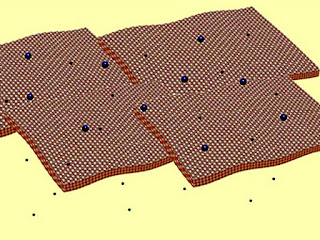MINNEAPOLIS / ST. PAUL (10/12/2011) —A University of Minnesota team of researchers has overcome a major hurdle in the quest to design a specialized type of molecular sieve that could make the production of gasoline, plastics and various chemicals more cost effective and energy efficient. The breakthrough research, led by chemical engineering and materials science professor Michael Tsapatsis in the university's College of Science and Engineering, is published in the most recent issue of the journal Science.
After more than a decade of research, the team devised a means for developing free-standing, ultra-thin zeolite nanosheets that as thin films can speed up the filtration process and require less energy. The team has a provisional patent and hopes to commercialize the technology.
“In addition to research on new renewable fuels, chemicals and natural plastics, we also need to look at the production processes of these and other products we use now and try to find ways to save energy,” Tsapatsis said.
Separating mixed substances can demand considerable amounts of energy—currently estimated to be approximately 15 percent of the total energy consumption—part of which is wasted due to process inefficiencies. In days of abundant and inexpensive fuel, this was not a major consideration when designing industrial separation processes such as distillation for purifying gasoline and polymer precursors. But as energy prices rise and policies promote efficiency, the need for more energy-efficient alternatives has grown.
The University of Minnesota team used sound waves in a specialized centrifuge process to develop “carpets” of flaky crystal-type nanosheets that are not only flat, but have just the right amount of thickness. The resulting product can be used to separate molecules as a sieve or as a membrane barrier in both research and industrial applications.
“We think this discovery holds great promise in commercial applications,” said Kumar Varoon, a University of Minnesota chemical engineering and materials science Ph.D. candidate and one of the primary authors of the paper published in Science. “This material has good coverage and is very thin. It could significantly reduce production costs in refineries and save energy.”
Members of the research team include Ph.D. candidates Kumar Varoon and Xueyi Zhang; postdoctoral fellows Bahman Elyassi and Cgun-Yi Sung; former students and Ph.D. graduates Damien Brewer, Sandeep Kumar, J. Alex Lee and Sudeep Maheshwari, graduate student Anudha Mittal; former undergraduate student Melissa Gettel; and faculty members Matteo Cococcioni, Lorraine Francis, Alon McCormick, K. Andre Mkhoyan and Michael Tsapatsis.
This research is being funded by the United States Department of Energy (including the Carbon Sequestration Program and the Catalysis Center for Energy Innovation – An Energy Frontier Center), the National Science Foundation and a variety of University of Minnesota partners.
Contacts: Rhonda Zurn, College of Science and Engineering, rzurn@umn.edu, (612) 626-7959 Preston Smith, University News Service, smith@umn.edu, (612) 625-0552












No comments:
Post a Comment